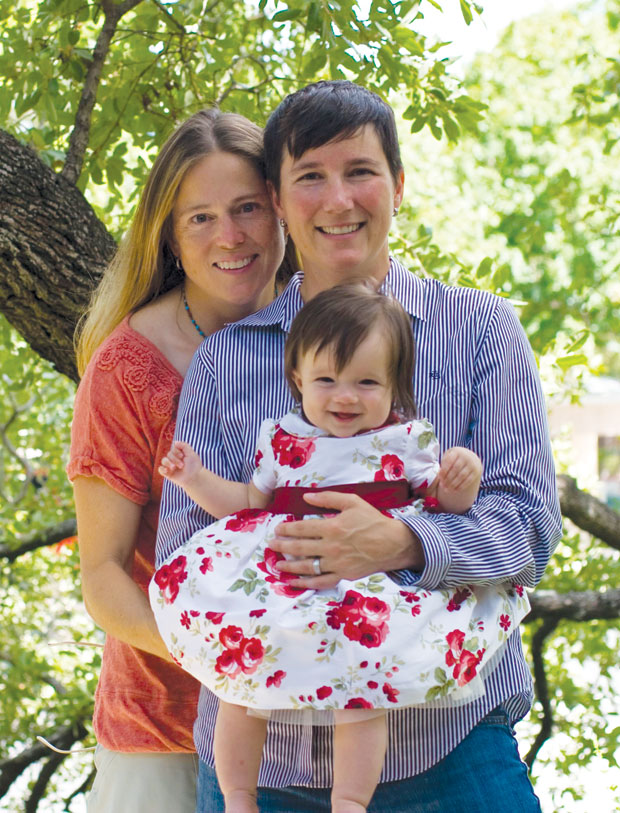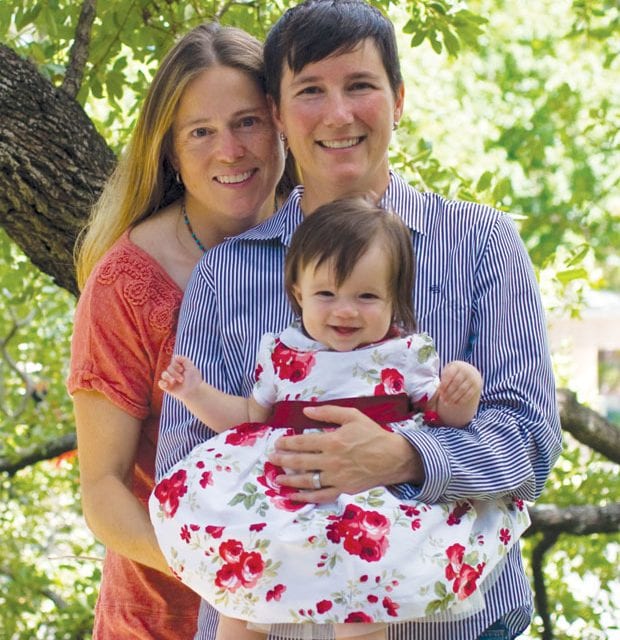Unit turns away Iraq veteran’s wife, says it won’t process applications for benefits due to amendment banning same-sex marriage

ACCESS DENIED | Alicia Butler, left, was denied an ID for access to the base where her wife, National Guard member Judith Chedville, is stationed. Butler and Chedville have a 51⁄2-month-old daughter, Jordan.
Judith Chedville served in Iraq and Kuwait with the Texas Air National Guard. After her tour of duty was complete, she left but decided last year to re-enlist and now serves in the Army National Guard.
“People who want to do that kind of service have a certain drive to do that,” sais Chedville’s wife, Alicia Butler.
Butler and Chedville married in California in 2008, a month before Prop 8 passed. Earlier this year they had a baby.
When the Department of Defense began offering benefits to same-sex couples on Sept. 3, Butler went to Camp Mabry, near their house in Austin where Chedville serves, to get an ID for access to the base.
She was turned away.
Texas Military Forces, which is over the Texas National Guard, announced that despite a Pentagon directive, it won’t process applications for benefits from same-sex spouses, due to the state’s constitutional amendment banning same-sex marriage. Texas Military Forces spokeswoman Laura Lopez said in an email to Dallas Voice that same-sex military spouses will still be offered benefits, but they must sign up at a federal military base.
“We fully support same-sex families enrolling for benefits at the nearest federal installation,” Lopez wrote.
Butler, an attorney who represents plaintiffs in civil cases, thinks a negotiated settlement is in everyone’s best interests. Military families in Texas are going to get the same benefits as in every other state. And Texas would avoid a court battle directly challenging the state law that contradicts federal policy — which is based on a Supreme Court ruling, she said.
Although she expects to receive federal benefits soon, the nearest federal installation to her Austin home is in San Antonio, 70 miles south, or Fort Hood, 70 miles north. Other federal facilities registering same-sex partners are at least three hours away. Butler is caring for Jordan, the couple’s 5 ½-month-old baby. Either she’ll have to take Jordan in the car several hours or Chedville will have to take time off.
Since Chedville’s civilian nursing job provides the family with health insurance, that wasn’t Butler’s main concern with Texas’ refusal to recognize her relationship.
“If she gets activated for state action, would Texas deny me benefits, if she lost her life serving the state?” Butler said. That action could be during a hurricane or a disaster like the West explosion when National Guard troops are normally called by the governor.
But her other concern was a more practical, everyday one. Chedville was pumping breast milk for their infant and left a piece of the pump at home. Butler ran it to the base but was denied access. So they had to meet off-base, wasting time and taking Chedville away from her job.
Without the ID card, “there are just extra hoops to jump through,” Butler said.
Lambda Legal Supervising Senior Staff Attorney Ken Upton said there’s no justification for Texas to be the only state not participating.
“Texans are not going to be denied benefits,” he said.
He said the state is just adding undue burden to apply for them.
“What’s really shameful is that other states who should be leading the way are not doing it,” he said. “The real story is the states not doing this to people — like Oklahoma.”
Col. Max Moss, spokesman for the Oklahoma National Guard, said his state would process applications for same-sex couples the same as it would for opposite-sex couples.
Mississippi and Louisiana later joined Texas in refusing to accept applications at state offices but is accepting them at other facilities.
Upton also questioned the relationship between Texas and federal government relating to the guard and wondered if Texas was doing something illegal.
Both the president and governor have the right to call up the guard. Texas receives equipment as well as money from the federal government for maintaining the Guard. Because of those ties, he wondered how Texas could justify placing state law over federal.
Even if the federal government doesn’t force the state into processing the IDs, Upton suggested, as a courtesy Texas could take the applications and forward them to the federal government.
To accommodate troops stationed in places that won’t marry same-sex couples, the Department of Defense is giving service members who have to travel more than 100 miles to a state that will marry them seven-day leaves. Those who have to travel overseas may take up to 10 days off to marry.
In addition, the Department of Veteran’s Affairs announced on Sept. 4 it will follow the lead of the Department of Defense, extending veterans benefits to same-sex couples.
“The administration will no longer enforce statutory language governing the Veterans Administration (VA) and the Department of Defense (DoD) that restricts the awarding of spousal benefits to opposite-sex marriages only,” a White House press release said.
So Butler will receive her benefits as the wife of an active duty soldier and later as the wife of a veteran. But after being denied enrollment at Camp Mabry, she filed a complaint with the Army Office of the Inspector General.
“The Department of Defense could step in and tell them to stop being silly about this,” Butler said, hoping to help military spouses apply in the future.
She said she made her appointment to submit her application at Fort Hood on Sept. 17.
“Hopefully that’s the end of it,” she said.
And after all the fuss Texas made, that ID issued at Fort Hood should gain her access to Camp Mabry, she said. Guards at the base would have no way to know which cards were issued to same-sex spouses and which ones were issued to opposite-sex spouses.
“Unless they put a pink triangle on it,” she said.
Or keep lists of suspected same-sex spouses at the gate.
This article appeared in the Dallas Voice print edition September 6, 2013.

